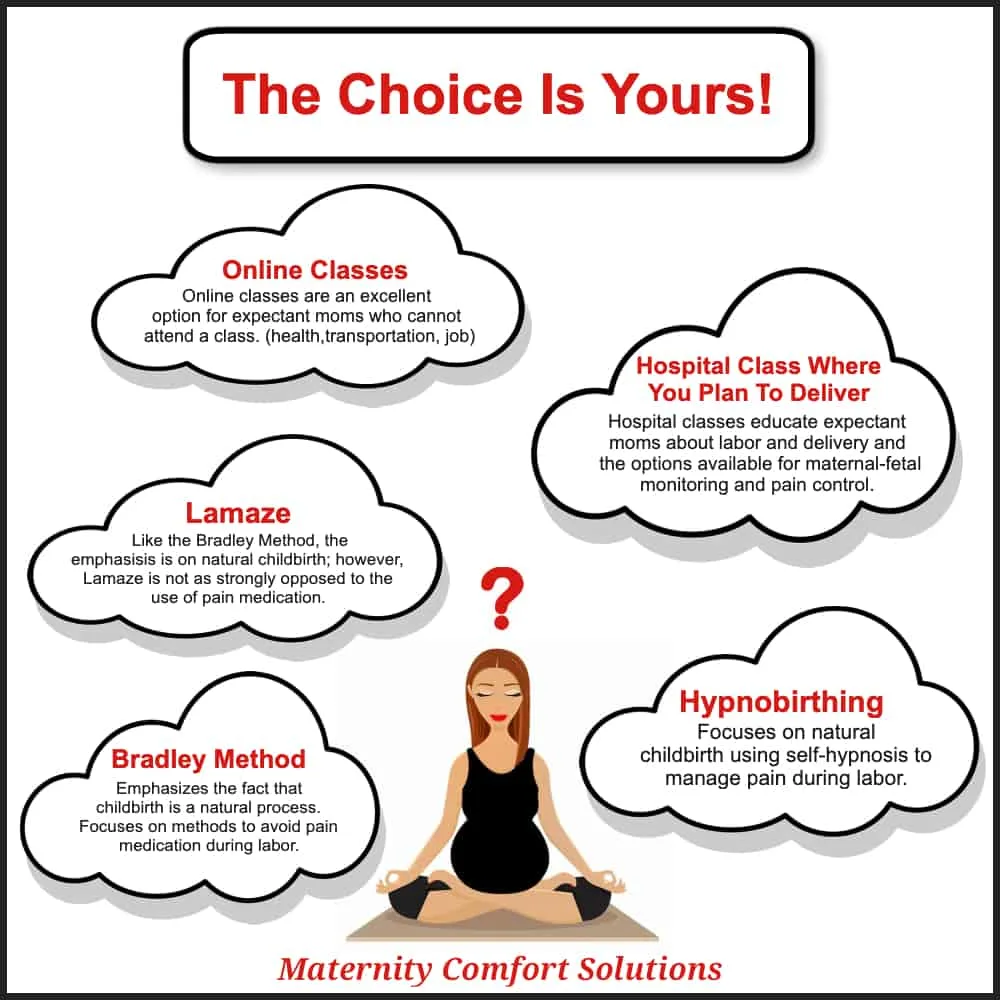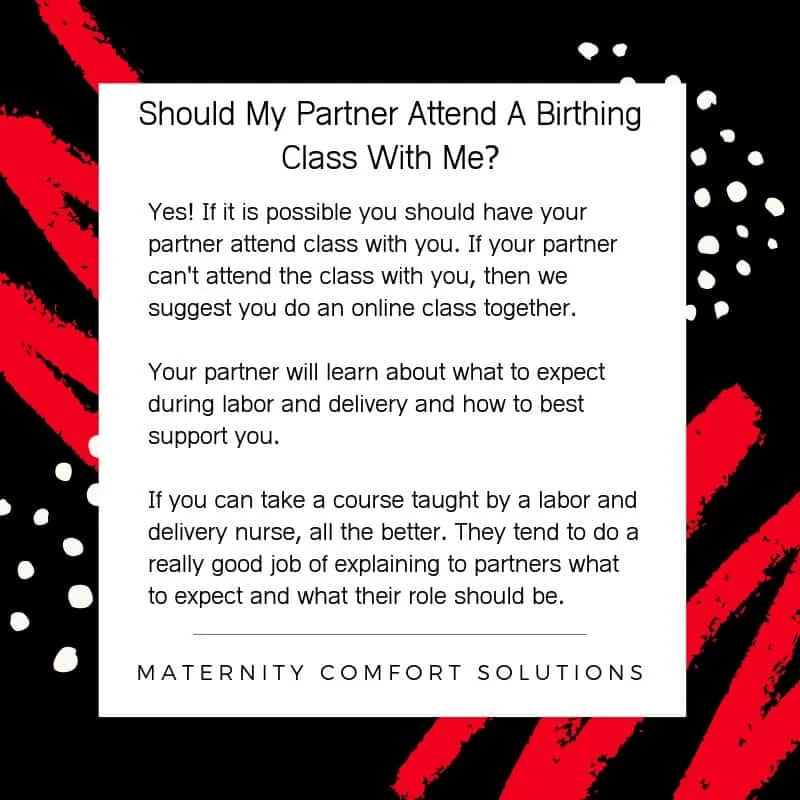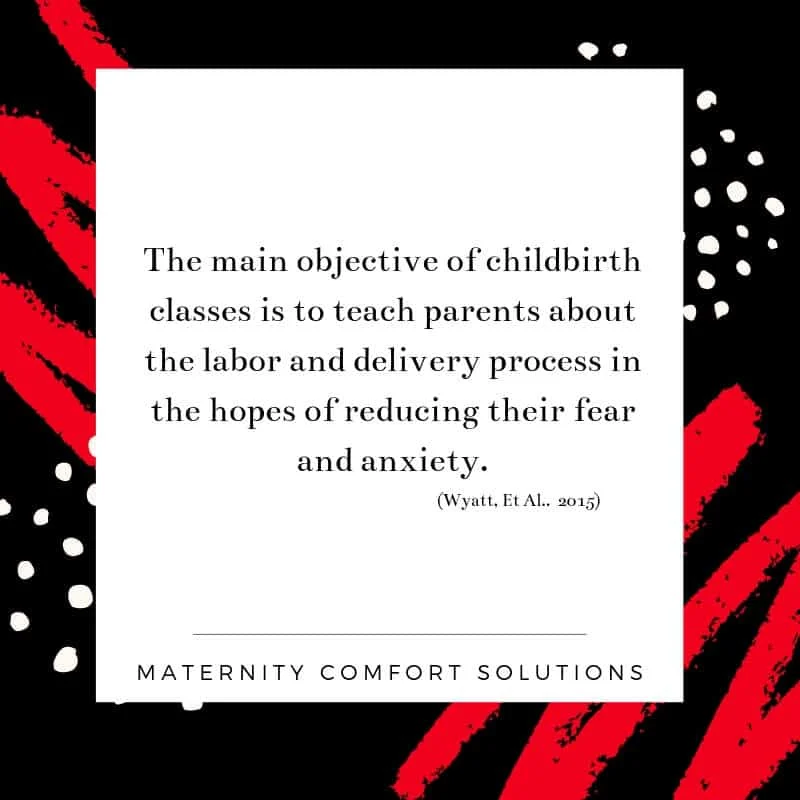Updated October 25, 2023
Childbirth education and birthing classes are a topic that most expectant parents will hear about frequently throughout pregnancy.
Many pregnant women have asked us: Are childbirth classes necessary?
Our answer is Yes! Absolutely. Especially for first-time moms.
Taking a childbirth prep class is the best way to alleviate any fears, and anxiety or clear up any labor and delivery myths you may have heard.

If you are not sure if a birth class will be helpful and want to know what types of childbirth classes are offered, read on!
We have lots to share to help you make the best decisions for you and your pregnancy.
Before we get started, you will want to make sure the class you choose is in alignment with your philosophy and personal beliefs about childbirth.
The information offered in the class should support the choices you have made for your birth plan.
We are going to explain the most common types of in-person childbirth classes as well as the options available to take a prenatal birth class online from the comfort of your couch.

Are Childbirth Classes Necessary?
Yes. We believe they really are.
Let’s talk a little bit about the objectives of childbirth education and the role of your childbirth educator.
The main objective of childbirth classes is to teach parents about the labor and delivery process in the hopes of reducing their fear and anxiety. (Source)
Fears surrounding the childbirth process are common and are often exacerbated by what pregnant women read on social media and hear from well-meaning family and friends.
The role of the childbirth instructor is to educate the mom-to-be and her partner on the physical process of labor and delivery.
This includes comfort measures, pain management options, relaxation techniques, and information on c-sections and the postpartum recovery period.
A good childbirth class should also cover what to do if you have precipitous labor.
Every expectant mom should take a childbirth class. It is an essential part of your prenatal care. Taking a birthing class is not only about learning what happens in labor and delivery, but it is also about the entire childbirth experience from the onset of labor until you return home with your newborn. – Dr. Doug Penta, MD, OB/GYN
A Brief History of Childbirth Education
Childbirth education wasn’t always the formalized class that it is now.
Before the 1940s, childbirth education was informal and was often provided by female family members.
During this time women gave birth at home.
It wasn’t common for women to give birth in hospitals until advances occurred in both nursing and medicine.
Nurses and physicians began to understand more about cleanliness and transmission of disease. Obstetric interventions were developed to assist mothers with difficult labors.
Childbirth classes gradually evolved over the years to educate expectant moms about pain management during labor, postpartum care, and newborn care.
15 common questions pregnant women have about birth classes:
1. Why Are Childbirth Classes Necessary? Are birth classes still relevant?
This question often comes up during prenatal visits. Every expectant mom should take a childbirth class. It is an essential part of your prenatal care.
Sue’s personal birth story of why she wishes she had taken a birth class:
Taking a birthing class is not only about learning what happens in labor and delivery, but it is also about the entire childbirth experience from the onset of labor until you return home with your newborn.
After delivering babies for many years, I still took a childbirth class to prepare for our first child.
It was extremely informative and prepared everyone in the class for what to expect.
It didn’t matter how much you knew about childbirth coming into the class.
What mattered is that everyone had a thorough understanding of what to expect once the class was completed.
Taking a childbirth class has been shown in studies to increase the odds of having a vaginal delivery and parent satisfaction with their birth experience.
2. What is taught in a birthing class?
If you take a childbirth class at a hospital these are the topics that are usually covered:
- The onset of the signs and symptoms of labor
- Arrangements to get to the hospital admitting office.
- The initial hospital triage evaluation and admission to labor and delivery.
- Electronic fetal monitoring EFM) should be covered. Knowing what to expect with EFM can help reduce parental anxiety and fear during labor. (Source)
- The phases of labor and delivery.
- Your partner or support person will be shown techniques for supporting you and helping you through labor.
- You will learn pain control options including relaxation, breathing, and pain medications.
- The Cesarean section procedure will be explained.
- Postpartum care should be covered
- Hospital policies will be covered
- If the facility is designated as “Baby-Friendly”, the childbirth educator should explain what that means and what the specific policies are for hospitals with this designation.
- Early care of your newborn (How to change a diaper, how to safely swaddle).
- The course may cover the pre-registration process, which will be so helpful to have completed before you go into labor.
- The course should cover breastfeeding, formula feeding, and the role of lactation consultants.
- *Some classes may cover the signs and symptoms of baby blues, postpartum depression, and postpartum anxiety.
Some classes will also cover early newborn care, parenting through the first year, and how to handle family changes after you bring your baby home.

3. How will I benefit from attending a childbirth class?
The number one benefit is a reduction in the fear and anxiety associated with childbirth.
Other benefits of birth preparation classes include feeling more in control and confident during labor, better communication, and understanding with prenatal providers, and an increased likelihood of new moms choosing to breastfeed. (Source)
Birth preparation classes are especially helpful to first-time parents who are fearful of the childbirth process.
Education helps you have a better understanding of what happens during labor and delivery.
Feeling more knowledgeable can increase your confidence and ability to cope with the different stages of labor.
Your delivery is about you and your ability to deal with the labor and delivery process. There are several medications available for pain relief during labor and delivery.
You should discuss these options with your prenatal care provider. You may decide you want an epidural for pain relief during labor.
An individual may want an epidural for a number of reasons.
You should never be made to feel guilty for wanting an epidural or other pain medication during labor and delivery. Your body. Your labor. Your choice.
4. Should I attend class at the hospital or take an online class?
The best answer to this question is it depends.
If the childbirth class is held at the hospital where you plan to deliver, the information you will acquire is invaluable:
- You will learn the best route to get to the hospital and where to go once you arrive. This includes knowing what entrance to use and the location of the admitting office, labor and delivery, and the emergency room. You do not want to be finding these locations when you are in active labor as it will make the trip to the hospital far more stressful.
- Hospital classes also give you an opportunity to meet staff members from labor and delivery (the instructor for your childbirth education class is often a labor and delivery nurse).
- Though you will see labor and delivery when you take your maternity hospital tour, it is not uncommon for birthing classes to tour labor and delivery to become familiar with the hospital layout.

Online Childbirth Classes For First-Time Parents
When it comes to the information taught in a childbirth class, the development of online birth courses has made a tremendous contribution.
The information taught in a hospital childbirth course is extensive and moves quickly.
The benefit of adding an online childbirth class to your childbirth preparation is that you can go at your own pace.
You can rewind a video, you can take notes easier. Your birth partner is more likely to take an online class with you.
It is more convenient for many couples to take a course online when there is a conflict in work schedules.
5. When is the best time to take the class during my pregnancy?
The class is best taken early in the third trimester (between 28 and 32 weeks). The exact time you select will depend on a number of factors:
- Your daily routine, including childcare, work, and any other activities vying for your time.
- Assuming your partner will be attending, you will have to synchronize your schedules.
- If you will be full term during the hot summer months, you might want to consider the timing of the class you select based on where you live.
- If you have a pregnancy-related medical problem requiring bed rest, you will have to arrange an online childbirth class. (This is something you cannot predict given the fact that you will be scheduling the class early during your pregnancy.)

If you are not sure what facility you will be delivering at, you may want to attend more than one class.
If you have the opportunity to attend a class at the hospital where you will deliver, this can be very beneficial.
It will afford you the opportunity to become familiar with the hospital layout.
You may also have an opportunity to tour the labor and delivery area and meet some of the hospital staff.
6. When should I call and schedule the class?
It is best to schedule your class between 20 and 24 wks so you will establish a time that best accommodates your schedule.
By the time you are 24 weeks pregnant, you are more likely to know if there are going to be any pregnancy problems that might interfere with your ability to physically attend childbirth classes.
Problems certainly can develop well after 24 weeks and in this case, you can ask the office staff to help you reschedule your class.
There are now excellent interactive online classes that can be arranged if you are not able to attend an in-person class
Aside from being on bed rest, there are other reasons why you may not be able to attend a childbirth class and will want to consider an online childbirth course.
The courses offered online are excellent. For anyone who can manage to take a classroom course and online course, this can be a great idea.
Classroom instruction can be filled with distractions. In addition, some individuals simply find it easier to learn information through online courses.
If you take an online course you will definitely want to take a hospital tour so you will be familiar with the hospital layout when you go into labor.
7. Should my partner attend class with me?
Your partner should attend class with you if possible. You can also bring another member of your support team if you don’t have a partner or if they are unable to attend.
If you do have to attend the class by yourself, childbirth instructors will work with you.
Your partner will learn about the labor and delivery process.
What their role will be and how to best support you during labor. Some classes teach basic massage techniques that can help you relax during labor.
Having your partner participate in your labor and delivery is extremely important. It is one more compelling reason why the answer to the question: Are childbirth classes necessary? Is a definite yes!
Even if you work with a support person who will be at your delivery, this can make all the difference in your childbirth experience.

8. What do I bring to a birthing class? How do I prepare for a childbirth class?

For starters, you will want to wear loose-fitting clothing.
If you plan to go to class directly from work, you may want to pack more comfortable clothing.
One of the best ways to prepare for a childbirth class is to go over your birth plan or create one if you haven’t.
It doesn’t have to be a formal birth plan but it is a good idea to have some notion of what you hope your birth experience will be like.
This may help you come up with a list of questions or concerns you have that you can ask about during class.
If you attend class at a hospital or birthing center, there are a few items you will want to bring. Most classes will send you information ahead of time so you will know exactly what to bring.
If you are not sure what to bring, don’t hesitate to call and ask. The typical items you will want to take to a childbirth class are the following:
- Blanket
- Pillow
- Water Bottle

What kind of pillow should I bring to a birthing class?
The pillow you should bring to a birthing class is simply a standard pillow for your lower back since most exercises will be performed on the floor.
Though pregnancy pillows have become very popular, these pillows are designed to help maintain proper positioning during sleep and are not necessary for a birthing class.
Pregnancy pillows help support the neck, lower back, hips, and legs to help relieve musculoskeletal pain by taking the pressure off nerves that are compressed during pregnancy.
9. Where are childbirth classes held?
You will want to take your childbirth course at the facility where you plan to deliver.
If you can’t take a class at the facility where you plan to give birth, be sure to take a maternity hospital tour well before your due date.
Birthing classes are now held in many locations:
- Some medical offices offer childbirth education by an RN that has been certified to instruct a childbirth class.
- Hospitals often hold classes in the evening in open auditoriums or clinics.
- Birthing Centers
- Some classes are held at the home of certified childbirth educators.
- Lastly, and often most desirable, in this high-tech era, is the option of taking an online childbirth class.
Online childbirth classes are appealing for many reasons:
- Getting around in the third trimester can be exhausting and depending on the location of a birthing class it might simply be too much activity.
- If there are other children at home, an online course can be more accommodating.
- If you are working during the later stages of your pregnancy, attending a course at night can be difficult. This also applies to partners who most often want to be present and may have a conflicting schedule (especially if working at night).

10. How do I find a childbirth class in my area?
Since this will vary depending on where you live, the best way is to ask your prenatal care provider.
You may find that your medical office practice offers childbirth classes in the office after office hours.
Ask the office manager if childbirth classes are offered at the hospital affiliated with the medical practice.
This would be the best class to take if you are looking for a standard childbirth class,
Attending a class at the hospital you will be delivering will give you an opportunity to address many of the questions listed in this article.
You will learn where the hospital is located, you can confirm your registration, and you will likely get a tour of the hospital and have a chance to meet some of the staff and ask questions.
If you find that the hospital does not offer the class you plan to attend, you can also ask family members, friends, or work colleagues or do an online search.
Look for childbirth education organizations and community centers offering health care services.
To find locations of childbirth classes and make sure your class is covered by insurance, you could call your insurance provider and see if they give you a list of certified childbirth classes in your area.
In some areas, you will also find that there are some certified childbirth educators that offer classes in their homes.
Online classes are an excellent option if attending a class is not an option or does not appeal to you.
11. Will the class talk about hospital registration?
If you are far along in your pregnancy, you will recall all that paperwork you likely received early on as part of the registration process.
This paperwork passes through a number of hands before it is filed in the admissions office at the facility where you will deliver it.
If you are admitted to the hospital for a complication during your pregnancy, make sure your preadmission paperwork is returned to the admissions office and not sent to medical records.
12. Who teaches childbirth classes?
Childbirth classes are taught by certified childbirth education instructors. The instructor might even be a labor and delivery nurse or postpartum floor nurse.
Whoever teaches a certified childbirth class has been certified by CAPPA (see below). These individuals often choose to teach classes because they are passionate about childbirth education.
To be a childbirth educator you must be 18 years of age and certified by the Childbirth and Postpartum Professional Association (CAPPA).
This association was established in 1998 and ensures that childbirth educators receive standardized training including classroom instruction and clinical exposure to labor and delivery.
If you want to know who is teaching your course, just ask.
Oftentimes, instructors are teaching the course in addition to their full-time job. (Either at night or on the weekend.)
13. What types of birthing classes are available?
Birth preparation classes are especially helpful to first-time parents who are fearful of the childbirth process. Education helps you have a better understanding of what happens during labor and delivery. Feeling more knowledgeable can increase your confidence and ability to cope with the different stages of labor. – Sue Winters, RN
There are a number of types of childbirth preparation classes to choose from:
Childbirth Education Classes
- Interactive Online Classes
- Hospital Childbirth Education Classes
- Lamaze
- The Bradley Method
- Hypnobirthing
- Calm Birth Classes
1. Interactive Online Birth Classes
Online Classes have had a significant impact on childbirth education for expectant moms near term. Now that online birth classes are more interactive, they can be a great alternative for pregnant women unable to commute to a class:
- Because of scheduling or transportation issues.
- Complications such as premature labor, vaginal bleeding, or high blood pressure during pregnancy often require strict bed rest
- Because partners are unable to attend.
2. Hospital Childbirth Classes
Hospital childbirth classes are often taught by labor and delivery nurses and are designed to educate expectant moms and their partners about all aspects of the labor and delivery process.
It is best to attend the birthing class at the hospital where you plan to deliver.
Often the class will include a tour of the hospital and an opportunity to meet the medical staff who may be able to answer specific questions.
3. Lamaze Birth Class
Lamaze class approaches the birth experience as a normal, natural, and
healthy process. Lamaze has been in existence for many years and continues to evolve.
- The focus is on helping women feel confident and empowered during labor.
- The class is designed to help women feel comfortable and take part in the decisions that may have to be made during the course of their labor.
4. The Bradley Method Birthing Class
The Bradley Method Birthing Class is for women who want to learn alternative options to manage pain during labor. The course teaches many ways to manage pain during labor without the use of pain medication. It is an intense 12-week course and covers all aspects of labor and delivery.
Make sure you share the Bradley Method’s philosophy about pain management during childbirth.
5. Hypnobirthing
If you plan to take a hypnobirthing class, you will want to sign up early so you can start the class by the 25th week of your pregnancy.
It is important to allow yourself time to practice and master the various relaxation techniques.
Hypnobirthing students need to learn and practice various hypnotic techniques.
The goal of the glass is to use hypnosis to avoid the use of pain medication (if possible) and alleviate the fears and anxiety associated with childbirth.
Information about hypnobirthing classes in your area is best obtained through your personal healthcare provider.
This class is for individuals who are interested in using the practice of hypnosis during their labor and delivery.
Hypnobirthing, as well as the other childbirth classes discussed, can always be used with pain medication and still result in a positive experience.
It has clearly been shown that those individuals who have been taught alternative techniques (breathing, massage, hypnosis, meditation) will use less pain medication during labor.
6. Calm Birth Classes
Calm birth classes are a type of meditation and deep breathing that can be used during pregnancy and labor. The calm birth method can be used whether you plan a medicated or unmedicated labor and delivery.
How do I find a calm birth class in my area? Calm Birth Find A Teacher
14. What questions can I ask at a childbirth class?
Childbirth class discussion groups can be very helpful especially when there are women in the class who have had a prior delivery and are willing to share their experiences.
You can ask whatever questions you want in a childbirth class. The class instructor will determine if the question is best answered in the group or by your prenatal care provider.
The questions during the class usually will focus on details about the labor process and practical questions about what to do and where to go when labor begins.
Questions about clinical management should be addressed with your provider in the office.*
Examples of typical questions you might want to discuss during the class are the following:
- What are the signs of labor?
- When should I call my prenatal care provider?
* Yes there are complications relating to pregnancy, but it is always important to consider the source and discuss your concerns with medical professionals.

15. How much do childbirth classes cost? Does medical insurance cover the cost?
When it comes to taking a childbirth class, the cost (if not covered by insurance), might again raise the question: Are childbirth classes necessary? Don’t let this stop you from taking a class.
This varies depending on the duration of the class, the number of classes, and if you attend a class or take an online class. The price can range from $50 to $200.
Some insurance carriers cover the cost of childbirth classes.
You will want to call your insurance company ahead of time and ask any questions you have:
- Confirm you are covered, even if your policy states you are since there are many types of classes and you will want to be sure your class is covered.
- Get a receipt at the class to submit to your insurance company.

The one question expectant moms ask more than any other is: Are childbirth classes necessary?
This article was written to help answer this question. Childbirth classes are essential for anyone who wants to fully understand what happens during labor from the time you are admitted until you reach the postpartum floor.
Educating yourself so you will know what to expect is the most important step you can take to decrease your anxiety about childbirth.
Anxiety is a normal emotion to feel during pregnancy.
But how much anxiety is “normal”?
Most would agree there is a healthy level of anxiety.
The point at which anxiety can be concerning is when you do not feel in control.
Childbirth classes can help you learn to maintain control throughout your labor and delivery.
The single most important decision you can make for yourself is to simply do what “you” want to do during your pregnancy.
The opinions and advice (you never asked for) about what you “should” or “shouldn’t” do can be overwhelming.
If you take a childbirth class in alignment with your philosophy about pregnancy, it can have a positive impact on your overall childbirth experience.








